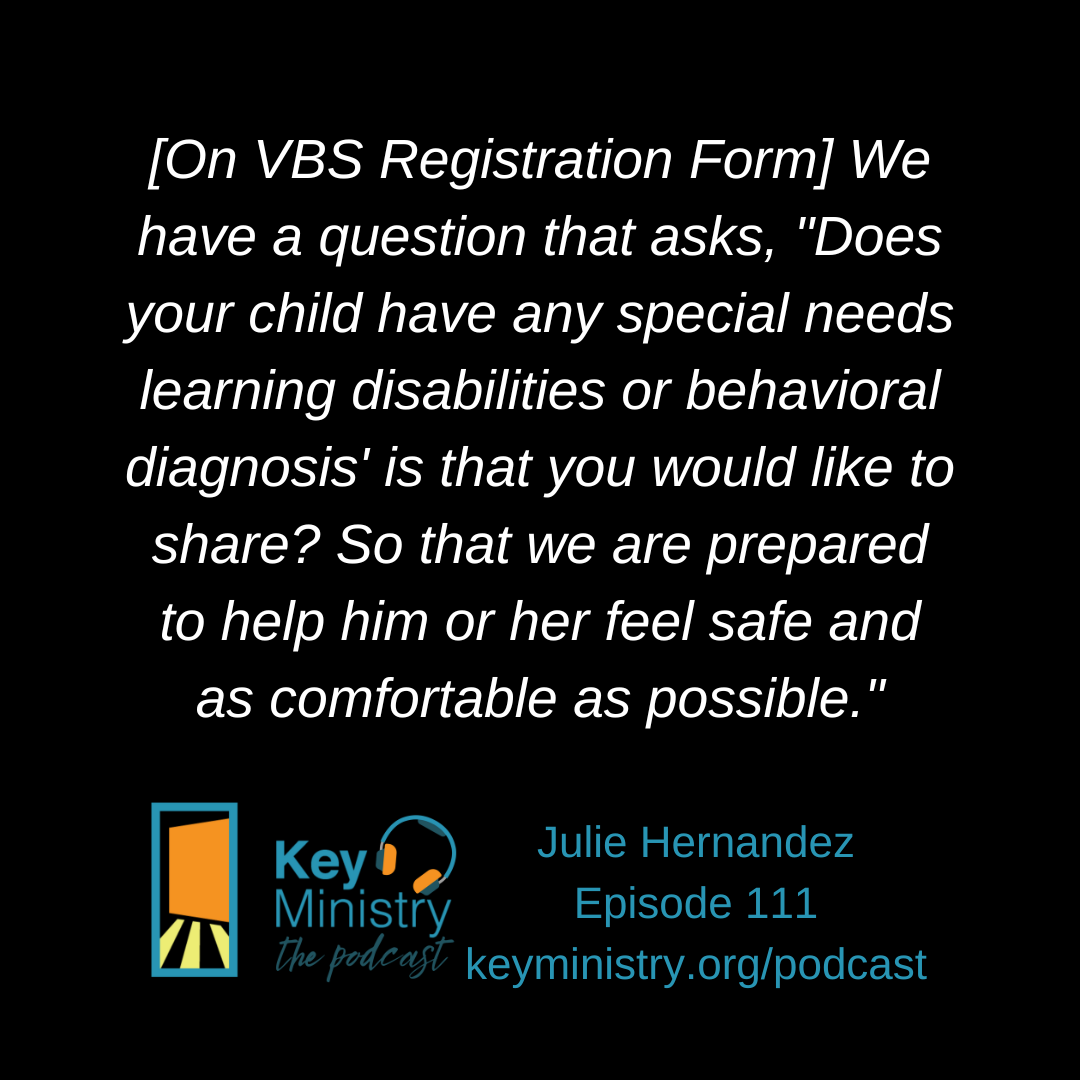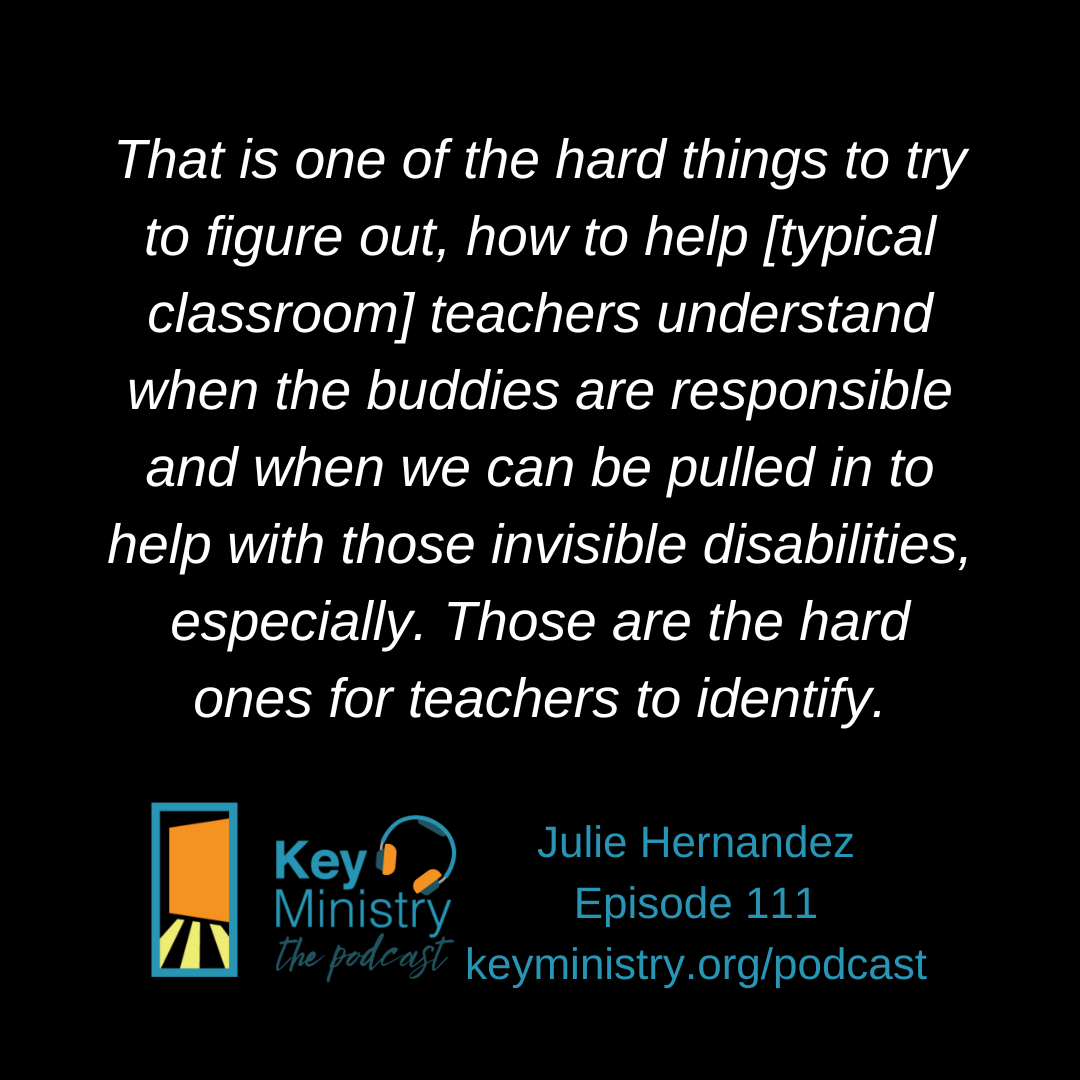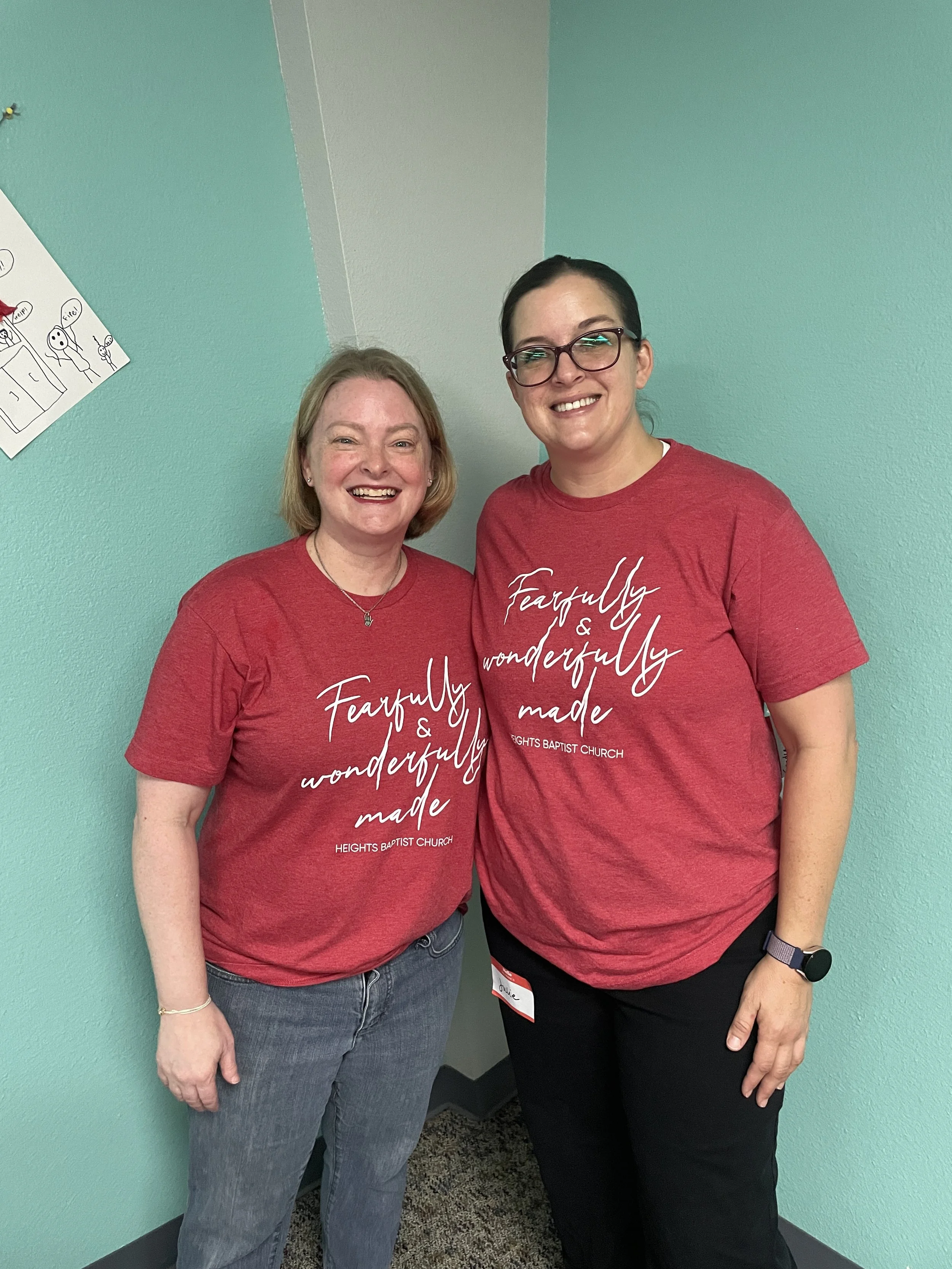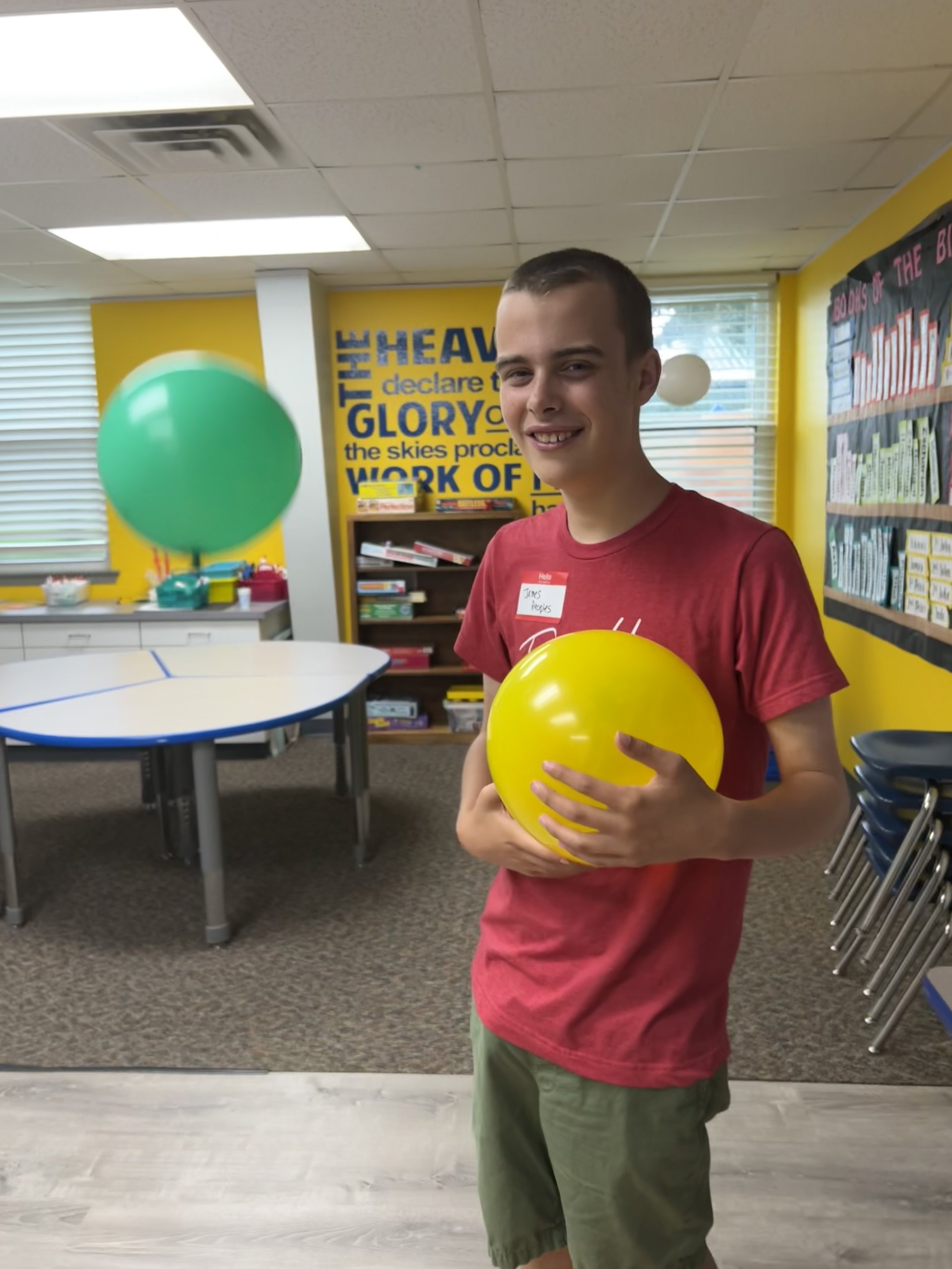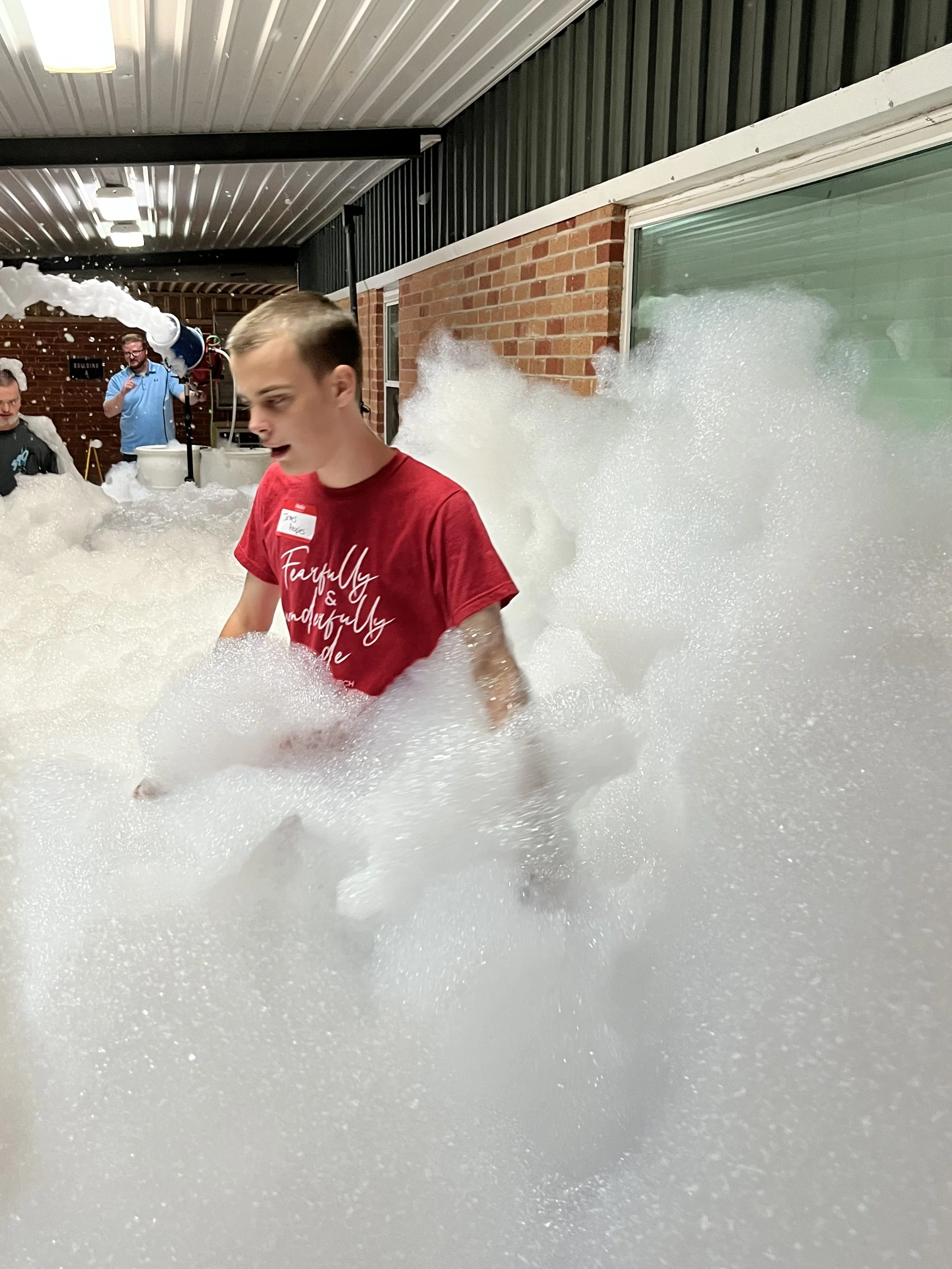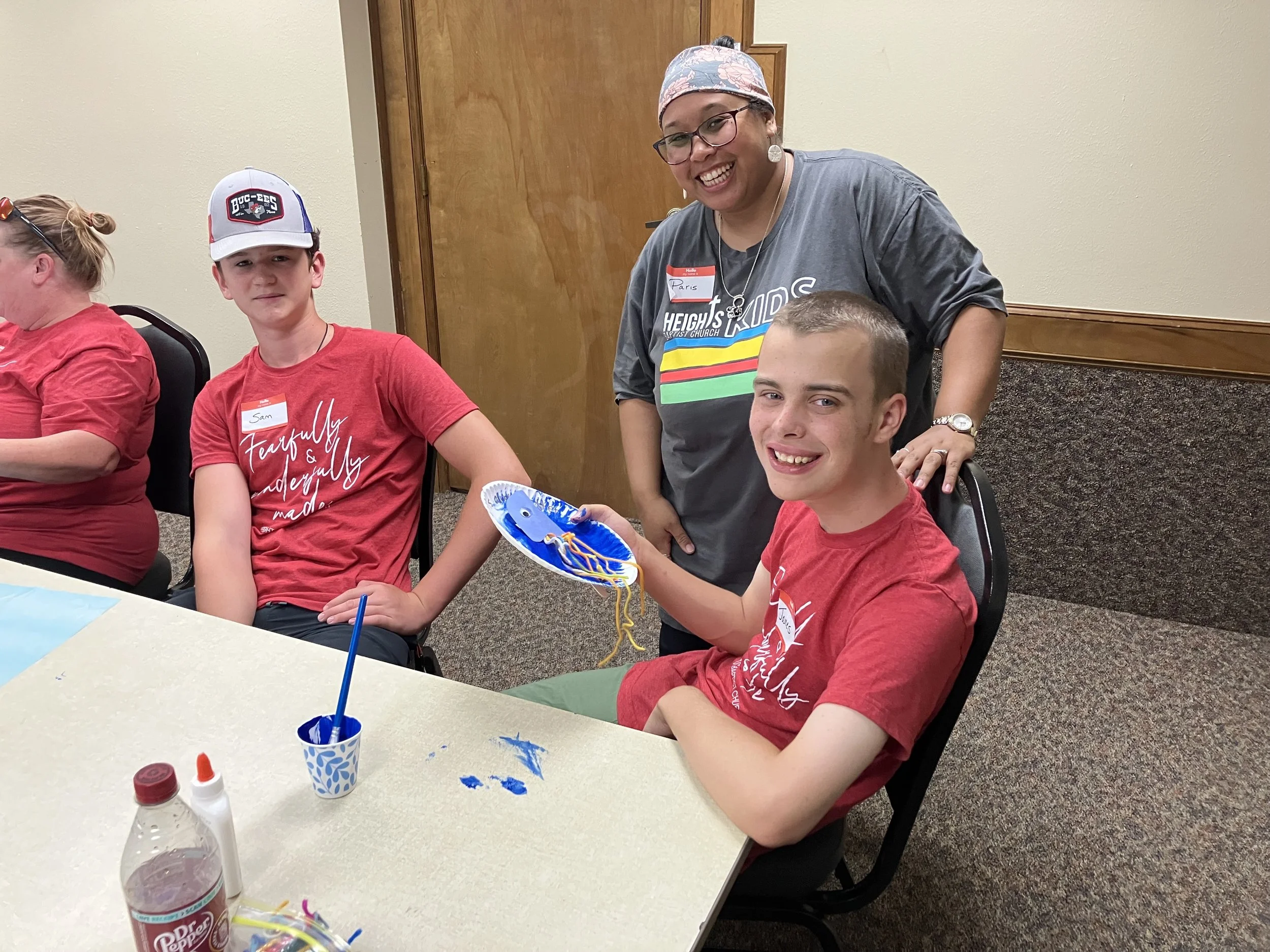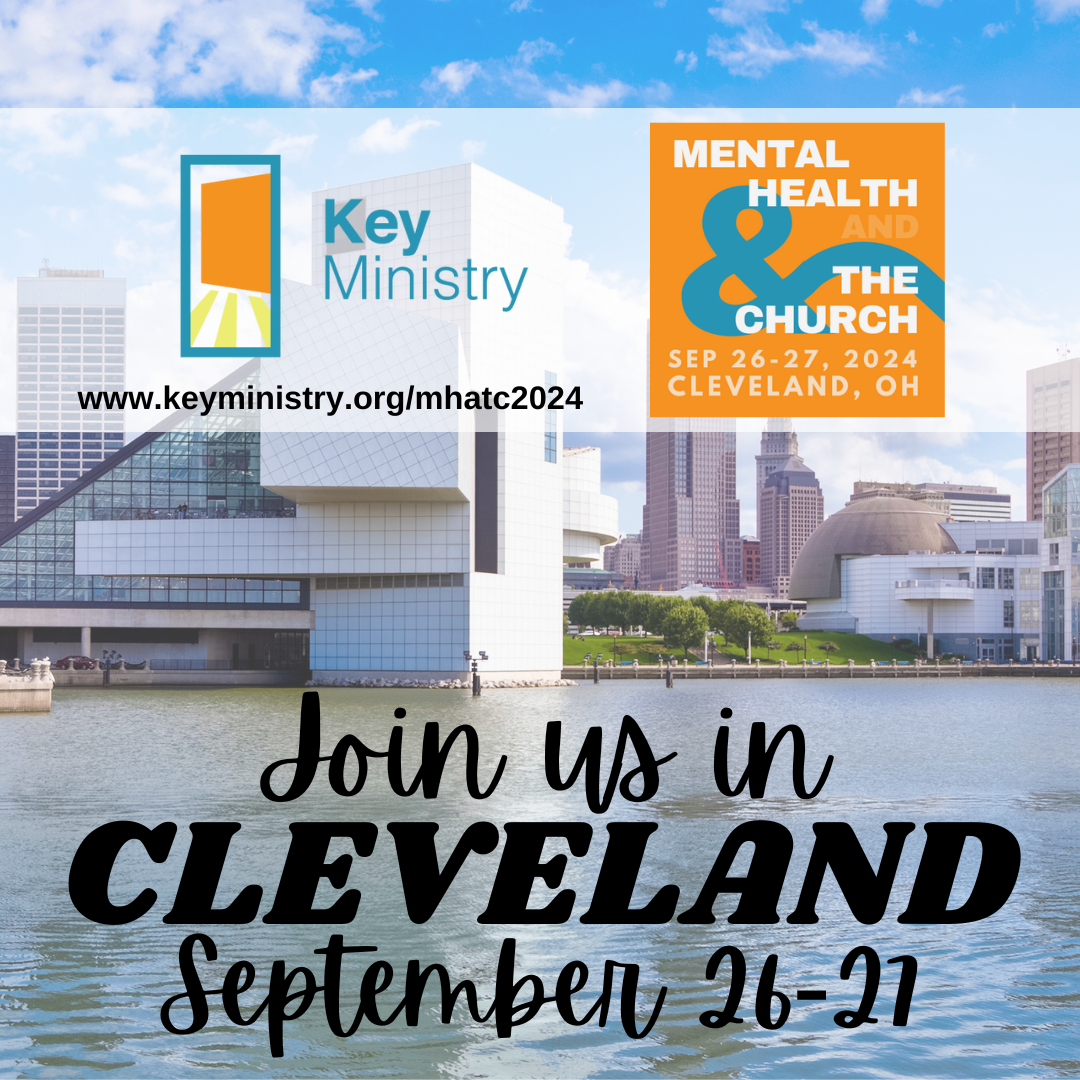Sandra Peoples talks with Julie Hernandez, the Disability Ministry Director at her church. They discuss the good and the challenging parts of their summer activities in Disability Ministry.
Listen Anywhere You Find Podcasts!
Sandra Peoples: Hi friends, this is episode 111 of Key Ministry, the podcast, and I am your co-host, Sandra Peoples. And I am excited today to be joined by Julie Hernandez, who I'm going to introduce you to in just a second. And we are talking through kind of a summer recap, just the highlights of the things we did in our church, in our disability ministry this summer. We're going to talk about the highs and the lows. Well, not really the lows, kind of just the, Hey, if we do this again next year, what would we change? Those kind of things. And I thought it would be fun to share with you guys, with our friends. And so Julie is very graciously joining me today and I'm really excited to introduce you guys to her. We work together at our church and get to partner with each other on all the activities like we did this summer. So welcome Julie to Key Ministry, the podcast.
Julie Hernandez: Thank you. It's nice to be here.
Sandra Peoples: Yeah. Alright, why don't you tell everybody your role at the church and whatever you want to do to kind of introduce yourself.
Julie Hernandez: Okay. Well, I am Julie Hernandez, and I have been working in our disability ministry for almost two years now. Maybe a little bit more than that before I started in the leadership role. But it has been a blessing to me and I have really, really enjoyed serving our kiddos and our families in this ministry. And so I'm excited to share with you guys today about what we have done this summer.
Sandra Peoples: Yeah, you're a huge blessing to our family, to our church, so I'm excited that we get to chat through everything. So we had a few highlights this summer that Julie and I are going to talk through. We're going to talk about our regular Vacation Bible School that we did. We did a disability specific Vacation Bible School, we're going to talk about that. And then to wrap up the summer, we hosted a sensory friendly movie. And so we're going to talk about all of those things, what went into all of it, and hopefully it'll be a helpful episode as we reflect on the summer and then a few things that we're looking forward to in the fall at our church as well.
Okay. So let's start with our regular VBS (Vacation Bible School). We do VBS at our church, our regular VBS in June, which is when our kids, like my son James, are in ESY (Extended School Year) So they're in summer school. So the kids that we normally have at our regular vacation Bible school are kids who wouldn't fit into a sensory class, but they do need buddies to be successful at Vacation Bible school. So the language we use is it's kids who, if they go to public school, they're like 504 kids because most of the kids who have IEPs are in summer school. So when we plan for vacation school, we don't have a separate sensory class. We just really focus on buddies with the kids. So because Vacation Bible School is open to families in the community, we don't always know the kids who are going to come to vacation Bible school, but we add a question to the registration form that lets us know so that the parent can let us know what to expect from the kid. So our question, how do we phrase the question?
Julie Hernandez: So on our registration form, we have a question that asks, "Does your child have any special needs learning disabilities or behavioral diagnosis' is that you would like to share? So that we are prepared to help him or her feel safe and as comfortable as possible." And that really just gives us a wide variety of responses in that we can prepare and know where kids are coming in and how we might be able to help them. And then along during the week, as we learn those kids, we learn what are the tools and tricks that help them participate and feel as comfortable as possible during our Vacation Bible School.
Sandra Peoples: Yeah, I think that's really helpful. I like the way we word that. I mean, if they put anything in that box, then we're following up and asking more questions. If they put something like autism, that is a pretty wide range of what the supports that they may need would look like. And so we're kind of following up asking more questions, trying to be as prepared as possible.
Julie Hernandez: Yes.
Sandra Peoples: And then, I mean, the better we know a child, sometimes we have a buddy that we assign to a child, and sometimes we have just a buddy that we assign to a classroom. So if it's higher needs, we assign a one-on-one buddy. And then if we don't know if the kid is actually going to need a buddy, but we want to be prepared, we just put a 'floater buddy' in that classroom,
Julie Hernandez: Right? So as these registrations come in and we learn more about the kids, we look at the class assignments and make sure that we have the right buddies paired up with the right kids with. So for example, this year we had a five-year-old who had down syndrome, and we knew she would need a lot, after communication with the parent, we knew she would need a one-on-one buddy and so we had one of our special education teachers paired up with her, and that was a great pairing. And so sometimes our kids, the parents indicate that they may not need a buddy, and so we can really just be a little bit more flexible in those rooms with those kids and just let the buddies know, Hey, this kid may need some assistance, but they may be just fine. And that's the way it kind of plays out with our buddies.
Sandra Peoples: One challenge we have is that we invite daycares to come and the daycare registers. So I think this year we had two daycares. The daycares themselves register the kids, and they don't always complete the forms the way that we hope that they did. And so one of our challenges this year was that we were prepared with buddies, either one-on-one or floater buddies for the kids whose parent who registered, directly registered, we were ready for them. And then the daycares came, not letting us know that they had kids with disabilities, and some of those kids actually had higher needs than the kids who had registered. And so that was tough. That was the first day or two felt tough.
Julie Hernandez: Yes, it did. It was a little overwhelming. And so we're really going to need to follow up with the daycares a little bit more and ask more questions and make sure that we get those registrations. And maybe even one of the things we talked about was maybe even ensuring that the daycares have a certain number of staff members on campus with a certain number of kids, or if they have kids who have higher needs that we may need to, because sometimes we're not a very big church and so sometimes our volunteers are, we're limited in the number of volunteers we have, and so we still want to be welcoming to those families and those kids with those disabilities. But we have to take everything into consideration. And so sometimes we may have to be a little bit outside of the box, think a little about outside the box with those situations,
Sandra Peoples: Because one of the two daycares only had one staff person on site and she brought, I don't know, 25 kids or something. And what do you think, three to five? I feel like it's like five.
Julie Hernandez: We had three, maybe up to five from that specific daycare that had some significant struggles and challenges with those kids. And so we had to have some. Yes. And the last day of the week, we were short staffed on our volunteers, and so we did have to ask her if she could bring more staff members with her or make some adjustments to who all came.
Sandra Peoples: Our buddies are adults, but adults are taking off work, and so we're limited on those numbers. And so we use teenagers as buddies. When we get these information about these kids, we're like, okay, which of these kids really need an adult? Which of these kids would be okay with the teenager? Which of these teenagers would be the best with certain kids? Would they respond better to a man or a boy? And I think we did a good job. I think overall, the kids did great. I think everybody was happy, but it just feels like you're kind of scrambling each day and you want to give your best, and that's hard to do when you don't have all the information you need.
Julie Hernandez: And flexibility is key with every day for VBS being different. We had to move some buddies around during different days, and once we learned some of our kids' needs and who was best able to support those kids in those classes. And so we had to just be flexible
Sandra Peoples: And I think we were, it was good. One of the things that I like that we do, so I guess we, okay, so when I did a podcast episode early, I talked about, Hey, here are the things we're excited about this year at our church. And I talked about our new sensory room, so let's talk about that right here because it kind of influences the other things we do. So our church is what we call a normal size church. We run about 400 in worship. We run about 80 to a 100 in children's ministry each week. So we have a sensory room on our preschool hall. But what we decided to do as a church was clean out what was a storage closet on the elementary hall and make that into a sensory room that turned out to be a much bigger project, which I mean, nobody's probably surprised by that.
The hope was to have it for Vacation Bible School. It wasn't ready for Vacation Bible School. It wasn't ready for disability. It's still not ready. We are almost the beginning of August and it's still not ready. But what we do at Vacation Bible School is we have two teenagers, my son David, and another boy that's close to David's age, and they stay in the sensory room the whole time. And that way if any of the kids need a break, their buddies bring them in there. It also helps us make sure that a kid and a buddy are not one-on-one by themselves at any point. And then when they drop the kiddo off with David and Gordon, then the buddy can get a break because the teachers get breaks when the kids are in wreck. But the buddies don't always get breaks when the kids are at rec because rec can be a time where they need the buddy.
Julie Hernandez: Right.
Sandra Peoples: So I mean, if we're thinking about things that went really well or that we for sure would want to do, again, I think having people in the sensory room all the time is really helpful. And of course, we do an opening ceremony
Julie Hernandez: Worship rally, yeah.
Sandra Peoples: Yeah, worship rally. Thank you. And a closing worship rally. And so the boys are in there for that, and we just kind of load them up with noise, reducing headphones and say, if anybody needs them, they're going to come to you kind thing. But I think that works well. I think our teenage buddies did great. I mean, some of them, they did amazing, really surprised me just because we hadn't worked with them before and how they did.
Julie Hernandez: We even had some young teenage helping out with as buddies, and they did great too. I was really surprised and excited to see how they interacted with our kids who have those invisible disabilities.
Sandra Peoples: They did a great job. So I think overall it went really well. I think one thing, and I think a lot of churches face this, so I think this is something I think sometimes our, and this is Vacation Bible School, but it can kind of be Sunday mornings too. It's hard for our teachers to understand what they are responsible for behavior wise and what a buddy is there to help do. I had a teacher say, well, I had a kid who was really wiggly during story time. I need a buddy. And I'm like, I cannot give you a buddy or a wiggly kid. We can't do that.
Julie Hernandez: Kids are wiggly, right?
Sandra Peoples: Yeah. That just seems, and I'm not being hard, I'm just saying we're just being honest about some of the challenges. And I think when they see, if they have a kid with a diagnosis, they automatically think, well, that falls to Julie, right? Julie is responsible for this kid helping this kid. Or when really a lot of them, they can do it themselves.
Julie Hernandez: That is one of the hard things to try to figure out how to help teachers understand when the buddies are responsible and when we can be pulled in to help with those invisible disabilities, especially, those are the hard ones for teachers to identify. And so maybe in our training next year, we can try to figure out how, I don't know, maybe give some more scenarios or some more situational kind of things to help them see the difference. And sometimes it just comes with experience too.
Sandra Peoples: Yeah, I think so. I mean, the longer we do this, I mean the more our teachers are used to it. Probably the first year that we said, Hey, we're going to open it up to kids with disabilities, it was harder that year, but we've done it for a lot and really mean, even though we have a disability ministry at our church, there's churches that don't have disability ministries, but at Vacation Bible School, they have kids with disabilities
Julie Hernandez: Those kids show up.
Sandra Peoples: It's just community kids. And especially the invisible disabilities we've talked about. They are present. And so being as prepared as possible is helpful, but a lot of that falls to those classroom teachers.
Julie Hernandez: It's a challenge.
Sandra Peoples: Yeah, I think in just about every grade, we would have more than one class for a grade. So there would be two third grade options. If we knew a kid had a disability, we could pick which teacher team we thought would be a good fit for that kid, which was helpful. But again, some of them were sneaky, not in a bad way, sneaky to us and just kind of like, oh!
Julie Hernandez: Kids always show up and we learn as we go.
Sandra Peoples: Yeah. But it was a good week.
Okay, so then, okay, so let's talk about the idea that we had for our disability inclusive VBS. So starting last year, our school district added a fall break, which pushed the start of the school year back by a week. Now, Julie is a teacher. She works for the school district, and so she goes back even sooner than the kids do. So that changed the ESY that got offered for our kids. And so normally James would have ESY in June and July, but starting last year, he only had it in June and didn't have it in July. So you and I were kind of like, is there something we can do that would be helpful to families in July who also lost this option of having ESY in July? I mean, unfortunately, we had the idea after the church budget had already been set and after other things were already on the calendar, but when we brought the idea to the staff, they were excited. They thought it would be great. And so you want to talk through some of the decisions we made when we were planning and the ideas that we had and how it all came together?
Julie Hernandez: Sure. So we had several brainstorming sessions where we would just sit and talk about, well, do we want to do it? I think we first started thinking well once a week so that those families could have something every week. And I know with some families that's helpful because then the kids have something to look forward to on that specific day. And so those routines are still in place, and sometimes that might be challenging for others to take vacations. But we tried it this way. We decided on Wednesday mornings in July, and so we decided the first three weeks we would do VBS classes. And we talked about the schedule. Do we want to rotate? Do we want to have kids in the classrooms the whole time? And so this time we decided that we would have a 9-9:30 session where kids were registering and parents were bringing the kids to their classrooms.
And so then the kids would have some music and free time playtime, just kind of exploring the classroom at that point. And then between 9:30 and 11:30, we did rotations where our classes rotated to, they had one session where they were in their classroom doing music and bible story or the Bible lesson and activities. And then they went to craft for 30 minutes. We had a playground/snack time so that we have a little playground in the back of our children's area. And so the kids, they took the kids out to the playground for about 15 to 20 minutes, and then they came back to their classroom for a special snack. One week it was popcorn, and then the other week it was trail mix. And one week it was going to be snow cones. And we had some changes in our schedule after the effect because of a hurricane, but it all worked out great.
And then the last session was rec time. And so we had a couple different activities planned during rec, and we can talk about that too. And then the last 30 minutes from 11:30 to 12 was for parents to come check out. So again, the teachers planned some kind of closing activity and the kids had some free time, and as parents were coming to pick up kids during that 30 minutes. And so those were our initial plans and ideas, and it turned out to be really great. I was really excited about how well it went.
Sandra Peoples: Yeah, I think so too. Now, we opened it up. We said we did ages 5 to 22, but if we knew the family and the participant was over 22, we were fine with that. So I mean, our idea was really anybody who, I mean 5 to 22 would be you're missing out on ESY kind was the idea. So we had a registration form up on the website. We advertised through Facebook groups, especially through, because I'm a parent, I'm in all kinds of area Facebook groups. So we posted it there. We had an initial registration, and then Julie followed up with a more detailed form. I think that was helpful. That just kind of increased the communication we had with those families. Most of the families that came were community families. I guess There were three regular…
Julie Hernandez: Attending members
Sandra Peoples: Not James and Ryan, and those are all teenage boys. So they're in at our church, the RISE class, which is our reverse inclusion class. Our total numbers one week was 13 participants, and the other week was 11 participants. We had four classes the first week, but then the second week we combined two of the classes to have three. I mean, like you said, we had a hurricane the first week and that threw things off. And then the third week it was really rainy and it was hard for families to get to us. I still think we had a great turnout. I'm just throwing out details. We used the Lifeway curriculum, we used the Special Buddies Book. I mean, for some of it we kind of used preschool craft ideas instead of elementary craft ideas. I think all of that went really well. We had our regular VBS teachers save some of their decorations, and we just put them out again. So that was helpful.
Julie Hernandez: We even recycled some of the curriculum packets. So the Special Buddies booklet that came was just a leader guide, and so we recycled some of our leader packets that had images and different things like that too.
Sandra Peoples: Yeah, I think that was good. We had some teenage buddy helpers, but I think because it was new, we had my David who gets roped into just about everything that we do.
Julie Hernandez: So grateful for David.
Sandra Peoples: The countdown is on for him to go to college, and I think our disability ministry will miss him and how easy he was to talk to doing things. But we had some other teenagers help. And then we had really strong classroom teachers who have experience either in special education or through our disability ministry. So I think that went well. We'll put in the show notes, which is on the website, I'll put some pictures from our time with James, and so they can see (See below). So the last day, the fun thing we did was get one of those really big bubble cannons, and so everybody did rec together, and we did the bubble cannon and snow cones, and I think that was really fun. We did warn the parents, Hey, they're going to get wet. And we did it last so that we wouldn't be responsible for changing anybody's clothes and the parents could just do it on their way home. So I think that went well. Oh, we did a parent lounge. That's a good idea. And because we're kind of suburban Houston, we didn't know how far families might be traveling. And so we set up, we normally have a room where the teachers take a break, and then we have people providing food for them. And so essentially, we just opened it up as a parent lounge also, and parents, if they wanted to stay on site, could be there and eat.
Julie Hernandez: Use the WIFI.
Sandra Peoples: Use the WIFI, anything they needed.
Julie Hernandez: Just have a comfortable place to stay.
Sandra Peoples: And I think a few, there were people both weeks that took advantage of that. So I still think that was a good idea.
Julie Hernandez: So we had one lead teacher for each of our classrooms and then some helpers and with them. So we had an average of two or three adults in each classroom, and some youth helpers. And then we had some leaders who helped with snack for adults, snack for kids. We had some of our pastors rotated into volunteering for and leading rec time and craft. We had some ladies who helped lead the craft time. And so really it took a lot of people to help bring it all together. But it was really a great experience, I think, for all who came.
Sandra Peoples: Yeah, I think so too. I mean, we had one family in particular who has talked to us about visiting before, but had never actually done it. And so they came one week and hopefully it was a good experience for the son and the mom so that they'll come back. I mean, we're planting those seeds. I mean, even if it's a family that's kind of familiar with us, but still just isn't a church going family, but they take advantage of extra things like this that we do. We're still serving families, so.
Julie Hernandez: That's right. And we had some families who go to other churches who came for this specific event, and so it was very successful.
Sandra Peoples: Yeah. So you think we'll do it again next year?
Julie Hernandez: I think so, yeah. After the first week, I was really bummed because our first week was what that got postponed or canceled because of the hurricane. And so by the second week I was like, man, I'm so disappointed that we only get to do this in one more week instead of two more. So I am very excited about doing it again next year. It was really, really a good experience.
Sandra Peoples: Yeah, I think so too. I think it was really fun. I'm glad that we did it. I mean, everything takes work, and so sometimes you're like, man, a lot of hours went into planning it, and especially because we didn't have that first week. It's two days, essentially. Two days of VBS, two different weeks. But it was still good.
Julie Hernandez: It was really good.
Sandra Peoples: And I was proud of the church staff jumping in because we had to provide childcare for the teachers who were helping us who had kids. And so we had that going on. I mean, we just had a lot of moving pieces, but I think everybody who participated, I think they enjoyed it. And hopefully we can wrangle 'em in to do it again next
Julie Hernandez: I think we can.
Sandra Peoples: Yeah, so July had five Wednesdays, but our teachers, we'll be back in school before the final fifth Wednesday. So instead of the last Wednesday being a Vacation Bible School day, we decided to contact the theater in town that we've done sensory friendly movies at before, but we really kind of haven't in a long time and ask them if they would host a sensory friendly movie for us on the last Wednesday of July. So this podcast is airing August 1st and the movie is happening to them yesterday, but to us it hasn't happened yet. So weird timeline on that. But we're doing Despicable Me Four and we've opened it up. So it is not just people who came to Vacation Bible School. We are advertising it through the community. It's free to families, the theater, so it's like a locally owned theater in our small town. So they will still sell popcorn and all the concession stuff, but they're not charging us for the movie, and we're not charging families.
So it's pretty sweet deal. And it doesn't require a whole lot of volunteers. So essentially the church staff is going to be there, and they will, I'll be there, Julie will be back in school, but I'll be there, and Lee, my husband will be there. He's the pastor of the church, and then some of the staff will be there. And essentially it's just kind of to welcome families there, explain to them what a sensory friendly movie is, where we turn the lights up and we turn the sound down, and then everybody understands that people may be up and down in their seats. So I think it'll be a good time too.
Julie Hernandez: Noise is okay. It's okay to make noise and be loud.
Sandra Peoples: And sometimes we bring fidgets in and a coloring table, like a table that we set up in the lobby where they can have coloring sheets. I don't know that we're going to get that done. And together with James home, I only have enough good hours to get a few things done. And of course, nobody misses out on it because we're not promising those things. It's just nice when we can do them. So I think it's going to be fun. I think they'll have a good time.
Julie Hernandez: It will be a good time.
Sandra Peoples: And then Lee stands up before the movie starts and welcomes them, and he tells them about our church and how we have classes for all ages with disabilities and buddies available. And so hopefully it's just kind of a commercial, I guess a little promo for the church to know for those families to know that they're welcome at church too. So in the fall, we're another season that we're looking forward to, so it's funny because we ordered everything for the sensory room, and it's just all in storage in our other rooms because it's still under construction. I mean, they found mold in the room, so they had to treat it for that. Then they found out how the room got moldy and it was a leak from the outside, so then they had to. So it's just all kinds of, so I mean, it's going to be nice once it gets done. It's just taking longer to get done. And of course, the hurricane kind of changed things because the crew that was working on the room had other priorities they needed to help families.
So we're excited about the room and when it's done, we will, I'll share pictures of it on Instagram, but I think it'll be nice. Part of the challenge that we've had is the sensory room being on the preschool hall and our kids who use the sensory room now, older elementary, and it's just hard to get these big bodies down the preschool hall, especially if they're stressed at that time. And we're trying to get them. So having a room at the end of the elementary hall, it's close to the bathrooms that are down there. It's really a good location.
Julie Hernandez: It's going to be so good. My kids are excited about it too.
Sandra Peoples: Yeah, it's going to be good. We're going to have a swing
Julie Hernandez: Fun, and we're getting some new fun things to play with and there for them, so that'll be really fun. We have a new bouncy board that's really fun.
Sandra Peoples: Yeah, that's fun.
Julie Hernandez: Some marble runs, and things.
Sandra Peoples: Which we've never had. The marble run is fun.
So it'll be good and it'll feel, so right now, the two rooms that we have on the preschool, they're joined by a Jack and Jill bathroom. And so we've had two rooms. So we've kind of had one as a sensory room and one that we do our lessons in. But those two will combine because we'll get the new sensory room and then our preschool ministry is growing, so they're going to take one of those rooms over again. And I really think, I mean, this Sunday, we may have three kiddos in that sensory class. So it'll be fun to see. It'll be great. And then the other thing we're excited about in the fall is another new class that we're adding. You want to tell 'em about that?
Julie Hernandez: Yeah. So we're starting another adult class. It's going to be very similar to our RISE Teen class or our reverse inclusion class. And so I've been meeting with a parent who has just had a vision and a leading to start a new class for adult boys, men, and young ladies who don't necessarily fit in another class in another adult class. And so we're really excited about that class. It's going to be very mentor inclusive where we have mentors with those kids. I say kids, and I know they're adults, but I'm a high school teacher. They're all kids to me.
But we're going to have mentors who kind of come alongside them. We're going to have games and fun activities for them to do and really just speak the gospel to them and just love on them and let their families know so that they have a place so their families can then go to worship and also Life Groups. And so we are working on setting up that room and getting some fun things purchased and set up in that room for them. We also were talking this morning about having a mini fridge and a bar for them to have coffee or treats so that they can feel adult and have their own little space to do those kinds of things. And then we also thought about, we're going to two services in August. And so that's going to present another challenge for our parents and families who have kids in this age group.
So this group is going to meet at 9 o'clock, and then they'll go to service at 10:30. And so another idea that we had this morning was if their life groups are meeting at 9 o'clock, 10:30, then what can we do for these families who want to go to their life group and go to worship at the opposite time? And so one thing we thought maybe something that we can do is incorporate an area where these adults can go sit together and worship maybe with a supervised person who just kind of sits with them, but then they can have that time where parents can go to worship, but then also go to the life group of their choice. And so we're excited about all the things as we make another opportunity for families just to get involved.
Sandra Peoples: Yeah, I think it's exciting. Yeah, I've talked about before how our RISE class goes into the service for the music, and then they go back to their classroom. So that class is younger than the new class that we're doing, and that's James's class. And it's hard for him. I think he's doing great sitting through the, we just don't know how he would do sitting through daddy's preaching because, and that class sits together and they enjoy doing that. James is much chattier when he sits with me than he is when he sits with his class. And so it's even helpful for him. I mean, I'm one of the pastor's wife who sits on the front row and James' class sits on the front row on their side. So we keep an eye on each other. James and I do, but he feels a little independence not sitting because the youth group, those kids don't sit with their parents. They sit together.
Julie Hernandez: I think that'll be a fun experience for those adults to have that independence and be able to experience that together.
Sandra Peoples: Yeah. Are we going to use Access?
Julie Hernandez: Think we're going to use Access. I think Leslie's looking at those things this week, and we're finalizing those things this week and going to be, we're going to be starting this class September 8th, so around, yeah. So we're getting things finalized now. The VBS is under our belt. We can move on to the next big thing.
Sandra Peoples: I know, there's always the next thing. I did want to point out that neither one of us has ever planned anything like a VBS. And so we kept texting each other, do we have a plan for this? Have we thought of that? And then there were some ways that the church staff just kind of took over and said, you need to do this. The food for the teachers, that's probably not something we would've prioritized. But regular VBS feeds the teachers meals every day of VBS. And so that was important to the support staff at church. And so we just let them run with that.
Julie Hernandez: And they did great. And it was wonderful.
Sandra Peoples: Yeah, it really was.
Julie Hernandez: It really felt nice too that they were treating us so well and taking care of us during our VBS time.
Sandra Peoples: Yeah, I think so. And I think it was good for people who don't regularly volunteer with us to see the families and to meet the participants and to see what a difference they're making. And I think that was really special too.
Julie Hernandez: Yeah, absolutely.
Sandra Peoples: I think it was good all around. I think that's it. That feels like a good summer recap. It was a fun summer. It makes me want to take a nap on this very rainy day.
Julie Hernandez: Yes. I think one day this week, I think I did fall asleep in the afternoon. I was like, yes, I'm so exhausted, but I don't usually take naps. But it's been a great busy summer. It's been really wonderful.
Sandra Peoples: Yeah, I think so too. I think it's been fun. I'm glad that we've been able to do so many things and bless families and show them how much we appreciate them and how they care for their kids.
It's been a good time. Thank you for listening to this episode of Key Ministry, the podcast. You can visit keyministry.org/podcast for the show notes, and we will link to things that we mentioned in this episode. I also did an episode when our church transitioned from me being the volunteer disability ministry leader to Julie being part-time paid disability ministry leader. And so we'll link to that episode just in case you guys are interested in how that went at our church. That was a big step for us and a needed step to make sure that we were able to pull things like this off because it's much easier to do together than it would've been for either one of us to have to do it on our own. So thank you for listening. We are excited for you all and the things that you have coming this fall. And so know that the Key Ministry Team is praying for you, and we are here to encourage you and hopefully provide resources that you find helpful. So thanks for listening.


